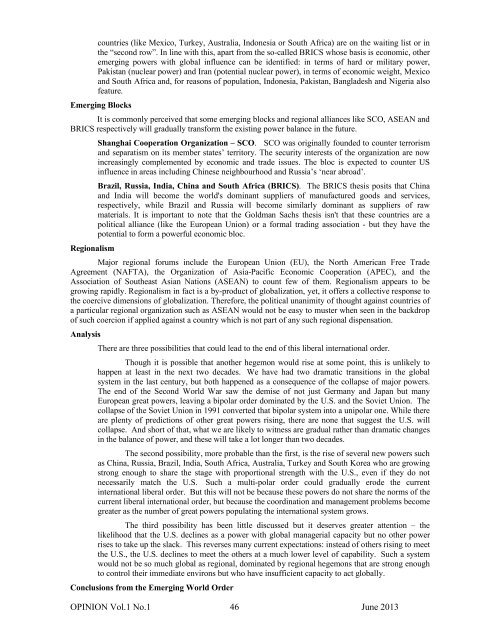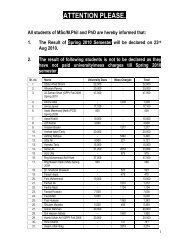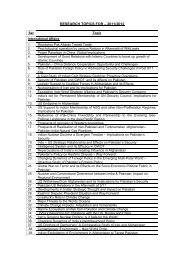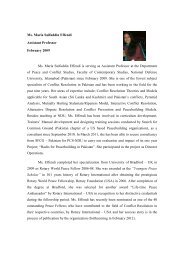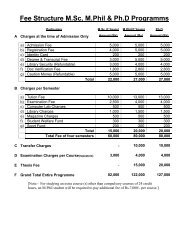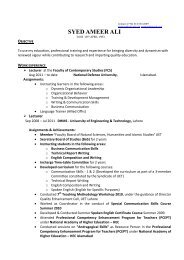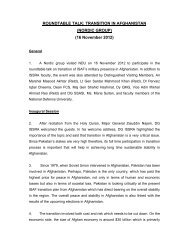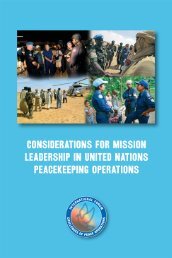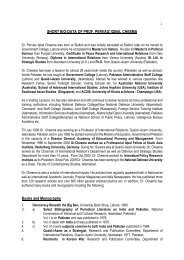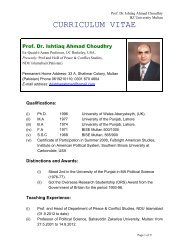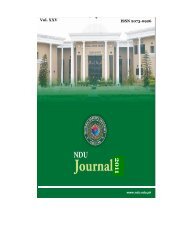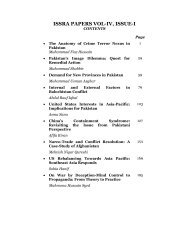OPINION Vol.1, No.1 June 2013 - National Defence University
OPINION Vol.1, No.1 June 2013 - National Defence University
OPINION Vol.1, No.1 June 2013 - National Defence University
You also want an ePaper? Increase the reach of your titles
YUMPU automatically turns print PDFs into web optimized ePapers that Google loves.
countries (like Mexico, Turkey, Australia, Indonesia or South Africa) are on the waiting list or in<br />
the “second row”. In line with this, apart from the so-called BRICS whose basis is economic, other<br />
emerging powers with global influence can be identified: in terms of hard or military power,<br />
Pakistan (nuclear power) and Iran (potential nuclear power), in terms of economic weight, Mexico<br />
and South Africa and, for reasons of population, Indonesia, Pakistan, Bangladesh and Nigeria also<br />
feature.<br />
Emerging Blocks<br />
It is commonly perceived that some emerging blocks and regional alliances like SCO, ASEAN and<br />
BRICS respectively will gradually transform the existing power balance in the future.<br />
Regionalism<br />
Shanghai Cooperation Organization – SCO. SCO was originally founded to counter terrorism<br />
and separatism on its member states’ territory. The security interests of the organization are now<br />
increasingly complemented by economic and trade issues. The bloc is expected to counter US<br />
influence in areas including Chinese neighbourhood and Russia’s ‘near abroad’.<br />
Brazil, Russia, India, China and South Africa (BRICS). The BRICS thesis posits that China<br />
and India will become the world's dominant suppliers of manufactured goods and services,<br />
respectively, while Brazil and Russia will become similarly dominant as suppliers of raw<br />
materials. It is important to note that the Goldman Sachs thesis isn't that these countries are a<br />
political alliance (like the European Union) or a formal trading association - but they have the<br />
potential to form a powerful economic bloc.<br />
Major regional forums include the European Union (EU), the North American Free Trade<br />
Agreement (NAFTA), the Organization of Asia-Pacific Economic Cooperation (APEC), and the<br />
Association of Southeast Asian Nations (ASEAN) to count few of them. Regionalism appears to be<br />
growing rapidly. Regionalism in fact is a by-product of globalization, yet, it offers a collective response to<br />
the coercive dimensions of globalization. Therefore, the political unanimity of thought against countries of<br />
a particular regional organization such as ASEAN would not be easy to muster when seen in the backdrop<br />
of such coercion if applied against a country which is not part of any such regional dispensation.<br />
Analysis<br />
There are three possibilities that could lead to the end of this liberal international order.<br />
Though it is possible that another hegemon would rise at some point, this is unlikely to<br />
happen at least in the next two decades. We have had two dramatic transitions in the global<br />
system in the last century, but both happened as a consequence of the collapse of major powers.<br />
The end of the Second World War saw the demise of not just Germany and Japan but many<br />
European great powers, leaving a bipolar order dominated by the U.S. and the Soviet Union. The<br />
collapse of the Soviet Union in 1991 converted that bipolar system into a unipolar one. While there<br />
are plenty of predictions of other great powers rising, there are none that suggest the U.S. will<br />
collapse. And short of that, what we are likely to witness are gradual rather than dramatic changes<br />
in the balance of power, and these will take a lot longer than two decades.<br />
The second possibility, more probable than the first, is the rise of several new powers such<br />
as China, Russia, Brazil, India, South Africa, Australia, Turkey and South Korea who are growing<br />
strong enough to share the stage with proportional strength with the U.S., even if they do not<br />
necessarily match the U.S. Such a multi-polar order could gradually erode the current<br />
international liberal order. But this will not be because these powers do not share the norms of the<br />
current liberal international order, but because the coordination and management problems become<br />
greater as the number of great powers populating the international system grows.<br />
The third possibility has been little discussed but it deserves greater attention – the<br />
likelihood that the U.S. declines as a power with global managerial capacity but no other power<br />
rises to take up the slack. This reverses many current expectations: instead of others rising to meet<br />
the U.S., the U.S. declines to meet the others at a much lower level of capability. Such a system<br />
would not be so much global as regional, dominated by regional hegemons that are strong enough<br />
to control their immediate environs but who have insufficient capacity to act globally.<br />
Conclusions from the Emerging World Order<br />
<strong>OPINION</strong> <strong>Vol.1</strong> <strong>No.1</strong> 46 <strong>June</strong> <strong>2013</strong>


